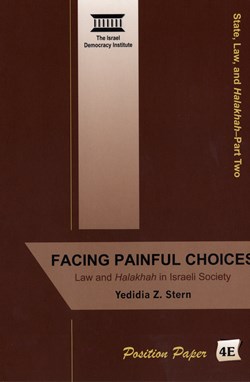State, Law, and Halakhah (Part Two)
Facing Painful Choices: Law and Halakhah in Israeli Society
English Policy Paper No. 4
- Written By: Prof. Yedidia Z. Stern
- Publication Date:
- Cover Type: Softcover | English
- Number Of Pages: 104 Pages
- Center: Religion and State Program
- Price: 45 NIS
The tension between state law and Jewish religious law is a constant source of strife in Israeli society. This policy paper by Prof. Yedidia Z. Stern asks how the intercultural battleground in Israel can be shifted away from the legal and political systems and toward the ideological ones.
The tension between state law and Jewish religious law is a constant source of strife in Israeli society. This policy paper by Prof. Yedidia Z. Stern asks how the intercultural battleground in Israel can be shifted away from the legal and political systems and toward the ideological ones.
For the Hebrew version of the book click here.
Chapter One: Introduction
Chapter Two: Cultural Duality
Chapter Three: Existing Strategies for Coping with Cultural Duality
Chapter Four: The Collapse of the Strategies
Chapter Five: From Cultural Duality to Normative Duality
Chapter Six: Normative Duality and Values
Chapter Seven: Judicial Imperialism
Chapter Eight: Judicial Reality
Chapter Nine: Summary
Notes
Jewish life in Israel is deeply affected by both Western-liberal civilization and Jewish-traditional civilization.
The question of how to function in a reality of dual cultural commitments affects the cohesion of Israeli society and its ability to survive.
Different Jewish communities endorse different strategies to cope with cultural duality: the religious choose compartmentalization (avoidance); the ultra-Orthodox alienation (withdrawal); and the secularists abdication (oblivion). All three strategies are equally ineffective, and none offers an inclusive model that integrates both cultures.
As a result of the intercultural tension, there has been increasing recourse to the law: state law vs. halakhic law. Each group—secular and religious—seeks to validate its inner identity and end the cultural struggle through judicial decisions. The "lawlization" and "halakhization" of Israeli society allows each side to twist the arm of the cultural "other" while absolving itself of any responsibility for the aggressive and intolerant connotations of this act.
This position paper engages in a parallel analysis of the use of state and halakhic law in Israel, revealing that the two legal systems have contrary attitudes to values. Despite their opposite approaches, both adopt a clear rhetoric of judicial imperialism, both consider their theoretical and practical scope as all-inclusive, and both claim exclusivity in the regulation of reality.
In order to stabilize Jewish society in Israel, however, both groups must now come to terms with Israel's cultural duality.

